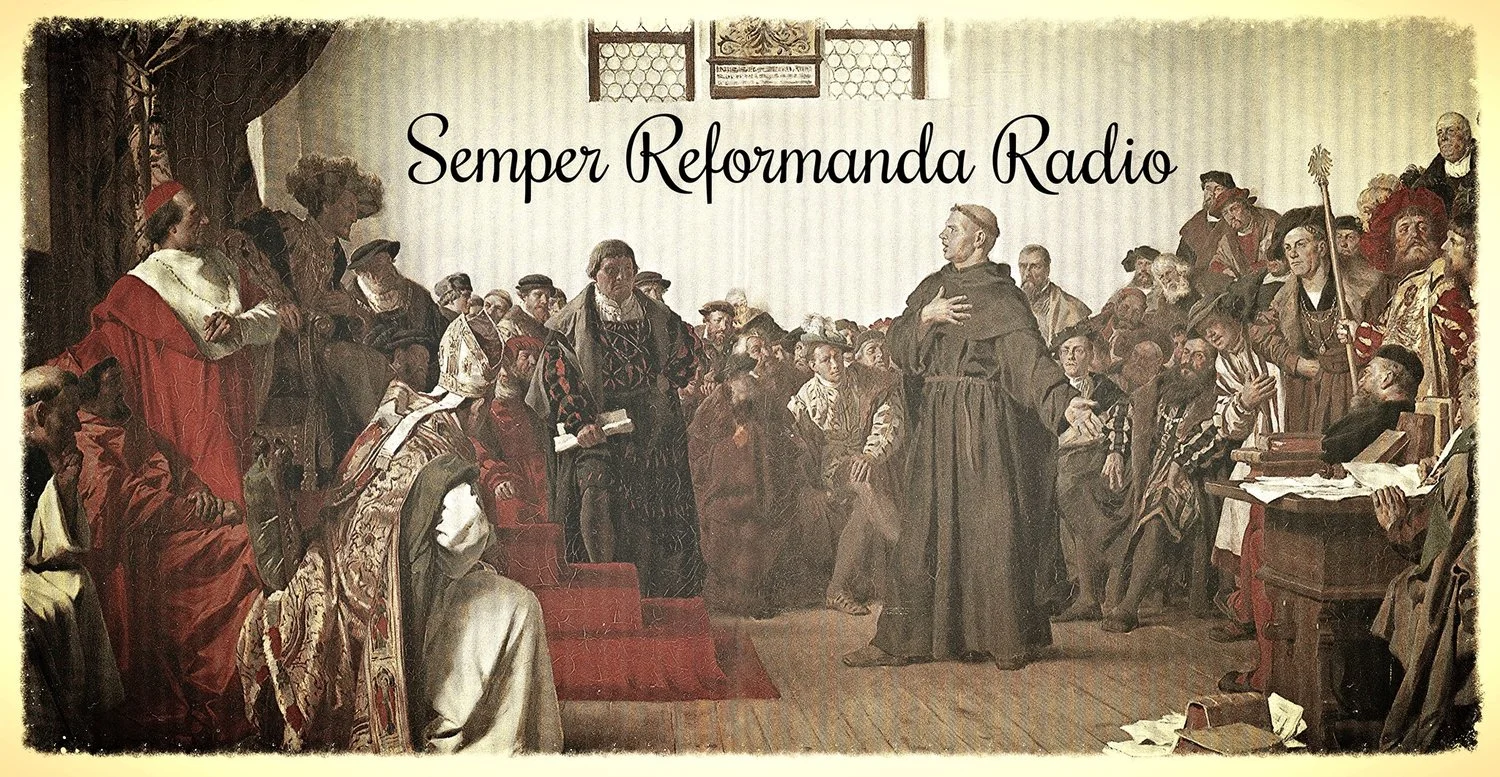The most pressing question to what's left of gospel-loving, Bible-believing Christianity in America is this: Will we be leaders or followers?
Nate Collins and “Revoice” refused to sign the excellent and thoroughly biblical “Nashville Statement.” The Nashville Statement can be viewed here: https://cbmw.org/nashville-statement/
Nate Collins was interviewed on the podcast called “Sheologians.” That program can be heard here: http://content.blubrry.com/sheologians/Sheologians-Nate-Collins-Revoice.mp3.
If you go to timestamp 1.30 you can hear Nate Collins describe himself as a “gay man” who is married to a woman and that he has 3 sons. To hear Nate Collins’s reasons for refusing to sign the “Nashville Statement,” go to time-stamp: 6.30 and listen for a few minutes. Specifically, here is a transcription of what Nate Collins says about the Nashville Statement and how it prompted him to found the Revoice organization:
Probably the thing that kicked it off in my mind was when the Nashville Statement came out. A lot of us felt that the Nashville Statement unfairly excluded people like me, people like Wesley Hill, people who would loosely be related to the Gay Christian movement. … I felt like there was some excluding going on and some foreclosing conversations by this event. … The idea for Revoice came in the aftermath of that. I thought, “ya know what? There needs to be some community that will welcome anybody who does not identify as straight, who has some complexity in the way they think about their gender and sexuality. And let’s welcome each other. Let’s have a place where we can gather together and enjoy each other’s company and find a new community.
What was “excluding” about the Nashville Statement? The statement consists of 14 articles, each of which has an affirmation and a denial. Here is what Nate Collins and Revoice did not like:
Article 7: WE AFFIRM that self-conception as male or female should be defined by God’s holy purposes in creation and redemption as revealed in Scripture. WE DENY that adopting a homosexual or transgender self-conception is consistent with God’s holy purposes in creation and redemption.
Article 8: WE AFFIRM that people who experience sexual attraction for the same sex may live a rich and fruitful life pleasing to God through faith in Jesus Christ, as they, like all Christians, walk in purity of life. WE DENY that sexual attraction for the same sex is part of the natural goodness of God’s original creation, or that it puts a person outside the hope of the gospel.
Article 10: WE AFFIRM that it is sinful to approve of homosexual immorality or transgenderism and that such approval constitutes an essential departure from Christian faithfulness and witness. WE DENY that the approval of homosexual immorality or transgenderism is a matter of moral indifference about which otherwise faithful Christians should agree to disagree.
Article 13: WE AFFIRM that the grace of God in Christ enables sinners to forsake transgender self-conceptions and by divine forbearance to accept the God-ordained link between one’s biological sex and one’s self-conception as male or female. WE DENY that the grace of God in Christ sanctions self-conceptions that are at odds with God’s revealed will.
These precious biblical and Christian truths spelled out in these particular articles of the Nashville Statement are, in point of fact, denied repeatedly and emphatically by the speakers at the Revoice Conference.
In this episode, we begin to analyze the second part of Marcus Grodi's evidence from the early church fathers that led to his conversion to Roman Catholicism: the Eucharist. We cover the origin of the Eucharist and the origin of the term "Sacrifice of the Mass" and begin to show from the early church that “the Eucharist” was the tithe offering for 300 years, until the end of the 4th century when the Roman Catholic Sacrifice of the Mass was born.
Show Notes:
Marcus Grodi: The Early Church Fathers I Never Saw - The Journey Home (3-19-2007)
On the late origin of the Roman Catholic Sacrifice of Christ’s Body and Blood in the Supper
Gregory of Nyssa, On the Space of Three Days, Oration 1 (382 AD)
Ambrose of Milan, Commentaries on Twelve Psalms of David, Psalm 38 (389 AD)
On Roman Catholicism’s inability to explain the origin of the term “the Mass” to refer to the Supper
Roman Catholic Encyclopedia, Ite Missa Est
On the “the Sacrifice of the Mass” originally referring to the dismissal of unbelievers for the offering of tithes and prayers
Justin Martyr, First Apology (155-156 AD)
Hippolytus of Rome, the Apostolic Tradition (c. 215 AD)
The Canons of the Council of Nicæa (325 AD)
The Canons of the Council of Nicæa (Greek and Latin) (325 AD)
Athanasius, Apology Against the Arians, Part 1 (c. 341 AD)
On Protestant efforts to redefine the Memorial Meal as an offering of Christ to the Father
Jim Jordan, Doing the Lord’s Supper, November, 1995
Jeffrey Meyers, The Lord’s Service: The Grace of Covenant Renewal Worship, 223 (2003)
Peter Leithart, Eucharistic Sacrifice, January 12, 2017
On the New Covenant Sacrifice of the Early Church
Justin Martyr, Dialogue with Trypho, Chapters 109- 124 (155-167 AD)
Irenæus, Against Heresies (174-189 AD)
Cyprian of Carthage, Treatise XII (c. 255 AD)
Tertullian, Against Marcion, Book III (208 AD)
Tertullian, Against Marcion, Book IV (208 AD)
Tertullian, On Prayer (c. 200 AD)
Origen, Homilies on Genesis, Homily XIII
Eusebius of Cæsarea, Proof of the Gospel, Book I (311 AD)
Aphrahat of Persia, Demonstration 4, On Prayer
On Cyprian’s statement “for the Lord's passion is the sacrifice which we offer”
Cyprian of Carthage, Epistle 62 (c. 253 - 257 AD)
Pontius the Deacon, The Life and Passion of St. Cyprian
Cyprian of Carthage, Epistle 59
Cyprian of Carthage, Epistle 33
Their Praise was their Sacrifice, part 5 (analysis of Cyprian’s use of “offer”)
The Didache (50s-90s AD)
The Interlinear Didache
Migne’s Series on the Greek Fathers
Clement of Rome, To the Corinthians (late 1st century)
Ignatius of Antioch, To the Smyrnæans (107 AD)
Justin Martyr, First Apology (155-156 AD)
This is some additional commentary on this article I wrote for the Aquila Report called "The Myth of Sexual Orientation"
https://www.theaquilareport.com/the-myth-of-sexual-orientation/#_ftnref2
Carlos and Tim catch up on emails, recent events, personal updates, and controversies about Apologetics and the Jeff Durbin/Andy Stanley exchange, School dress ups and gender, Christians and entertainment, Roman Catholic Baptism and Presbyterians, Charles Hodge and JH Thornwell, Richard Gaffin and Justification, and Piper and being Counted Righteous in Christ.
Charles Hodge on the Roman Catholic Church:
Indeed it is a matter of devout thankfulness to God that underneath the numerous grievous and destructive errors of the Romish Church, the great truths of the Gospel are preserved. The Trinity, the true divinity of Christ, the true doctrine concerning his person as God and man in two distinct natures and one person forever, salvation through his blood, regeneration and sanctification through the almighty power of the Spirit, the resurrection of the body, and eternal life, are doctrines on which the people of God in that communion live, and have produced such saintly men as St. Bernard, Fenelon, and doubtless thousands of others who are of the number of God’s elect. (John Robbins, http://www.trinityfoundation.org/journal.php?id=228)
References
http://www.trinitylectures.org/sacramental-sorcery-p-161.html
http://www.trinitylectures.org/emperor-has-no-clothes-the-p-182.html
CALVIN ON THE VALIDITY OF 'ROMISH' BAPTISM, http://www.semperreformanda.com/wp-content/uploads/2016/02/Calvin-on-the-Validity-of-Romish-Baptism-Dr.-F.N.-Lee.pdf
https://www.goodreads.com/review/show/2810687752
https://biblethumpingwingnut.com/2019/04/29/endgame/
Dallas Exhibits
This is an exposition of Romans 9:19-24. This used to be a passage that caused incredible consternation and angst in my soul. Today, it is a beautiful anchor amid the storms in which we now live. I pray it will be this for you too.
Here is a link to the new Legacy Edition of J. Greshem Machen’s masterpiece, Christianity and Liberalism:
Thomas Brooks outlined these 7 characteristics of false teachers in the 17th century. Nothing has changed. Here they are:
1. False teachers are men-pleasers. 2 Corinthians 11:13-15; Luke 6:26; Galatians 1:6-10; Isaiah 30:9-10; Jeremiah 23:16-17
2. False teachers are notable in casting dirt, scorn, and reproach upon the persons, names, and credits of Christ's most faithful ambassadors. 2 Corinthians 10:10
3. False teachers are venters of the devices and visions of their own heads and hearts. Jeremiah 14:14; 23:16; Matthew 24:4-5; Titus 1:10; Romans 16:18; Jeremiah 23:1-3
4. False teachers easily pass over the great and weighty things both of law and gospel, and stand most upon those things that are of the least importance and concern to the souls of men. 1 Timothy 1:5-7; Matthew 23:23; Romans 8:1; Galatians 3:1; Galatians 5:12; Philippians 3:2; Matthew 23:24
5. False teachers cover and color their dangerous principles and soul-deceptions with very fair speeches and plausible pretenses, with high notions and golden expressions. Galatians 6:12; Romans 16:17-18; Matthew 7:15
6. False teachers strive more to win over men to their opinions, than to better them in their lives. Matthew 23:15; Acts 20:28-30
7. False teachers make merchandise of their followers. Jeremiah 6:13; 2 Peter 2:3
In this episode, we give thirteen (there are many more) examples of invalid assumptions that inform many ancient and modern eschatologies, and the Scriptural answer to them. The episode serves as a summary of the first 21 episodes of the Danielic Imperative, and a prelude to the next 21 and beyond.
This is my precious Amy. She is a rare jewel of a wife. I thank God for every day He has shared her with me. One of my children snapped this picture when she wasn’t looking. That authentic smile while holding one of our 10 little ones in a sling… priceless. I put Proverbs 31:10-12 on this printing.
Questions 70 thru 78 of the Westminster Larger Catechism are glorious and wonderful summaries of vital gospel and biblical truths.
https://www.pcaac.org/wp-content/uploads/2012/11/LargerCatechismwithScriptureProofs1.pdf
This short study of the key gender specific passages of Scripture on womanhood is worth its weight in gold:
This is a running response to both of these programs on “Orthodoxy Now” back to back:




















